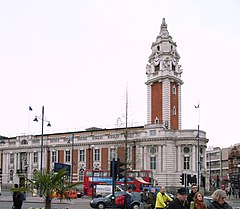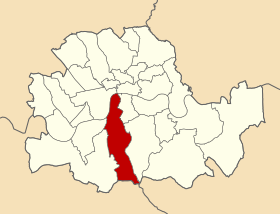Lambeth (parish)
| Lambeth | |
|---|---|
 Lambeth Town Hall |
|
 Lambeth within the County of London |
|
| History | |
| • Origin | Ancient parish |
| • Created | 1900 |
| • Abolished | 1965 |
| • Succeeded by | London Borough of Lambeth |
| Status | Metropolitan borough |
| Government | Lambeth Vestry (until 1900, reformed 1855) Lambeth Borough Council (1900–1965) |
| • HQ | St Mary's Church (until 1809) Vestry Hall, Church Street (1809–1853) Vestry Hall, Kennington Road (1853–1908) Town Hall, Brixton Hill (1908–1965) |
| • Motto | Spectemur Agendo (Let us be regarded according to our conduct) |
 Coat of arms of the borough council |
|
Lambeth was a civil parish and metropolitan borough in south London, England. It was an ancient parish in the county of Surrey. The parish was included in the area of responsibility of the Metropolitan Board of Works in 1855 and became part of the County of London in 1889. The parish of Lambeth became a metropolitan borough in 1900, following the London Government Act 1899, with the parish vestry replaced by a borough council. In 1965 the borough was abolished and its former area became part of the London Borough of Lambeth in Greater London.
The ancient parish was divided into the six divisions of Bishop's Liberty, Prince's Liberty, Vauxhall Liberty, Marsh and Wall Liberty, Lambeth Dean and Stockwell Liberty. It covered and area more than 7 miles (11.3 km) north to south, but only 2.75 miles (4.4 km) at its widest east to west. In addition to the historic riverside area of Lambeth, this included Kennington, Vauxhall, , Brixton, the western part of Herne Hill, Tulse Hill and West Norwood. In 1965 the borough was amalgamated with the Streatham and Clapham parts of the Metropolitan Borough of Wandsworth to form the new London Borough of Lambeth.
The ancient parish, dedicated to St Mary, was in the Diocese of Winchester until 1877, then the Diocese of Rochester until 1905, and then finally in the Diocese of Southwark. From 1824, as the population of Lambeth increased, a number of new parishes were formed:
...
Wikipedia
